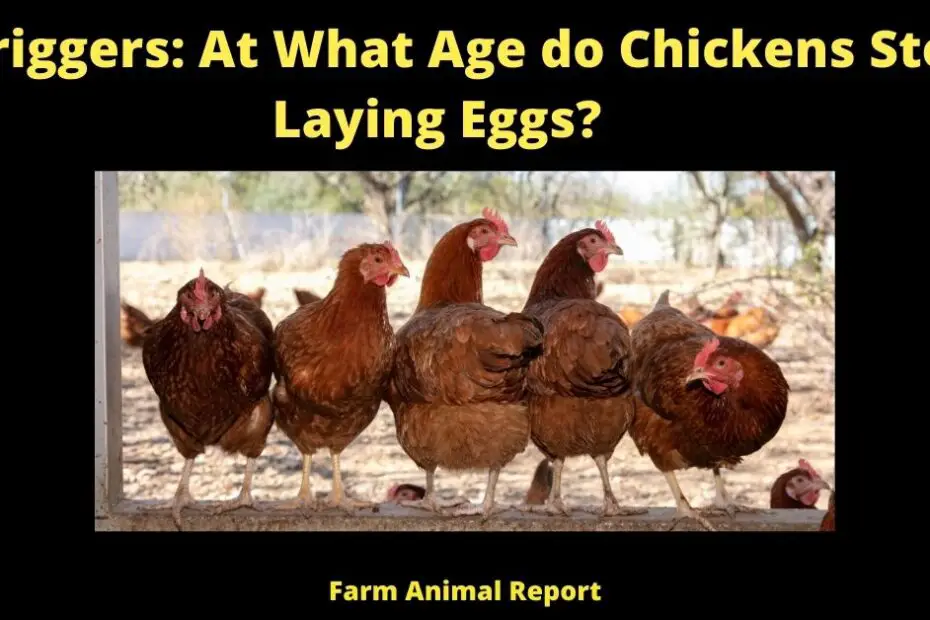Do you know how long chickens keep laying eggs? How about the average number of eggs a hen will lay per year? In this blog post, we will answer these questions and more! Chickens are amazing creatures, and their reproductive process is quite fascinating. We will cover everything from when chickens start laying eggs to when they stop. So, if you’re curious about chicken reproduction, keep reading!
At what Age do Chickens stop Laying Eggs?
The life cycle of a chicken begins when they are born, grow up, and start laying eggs. They usually live 6-8 years in backyard flocks but most commercial layers only produce them for 3-4 because as time goes on their production decreases with every year that passes by
See Our Article – 11 Ways to Make Money by Chicken Farming **2022**
Chickens are versatile birds, providing us with not only delicious eggs but also tasty meat. However, even the best laying hen will eventually stop producing eggs. So, at what age do chickens stop laying eggs?
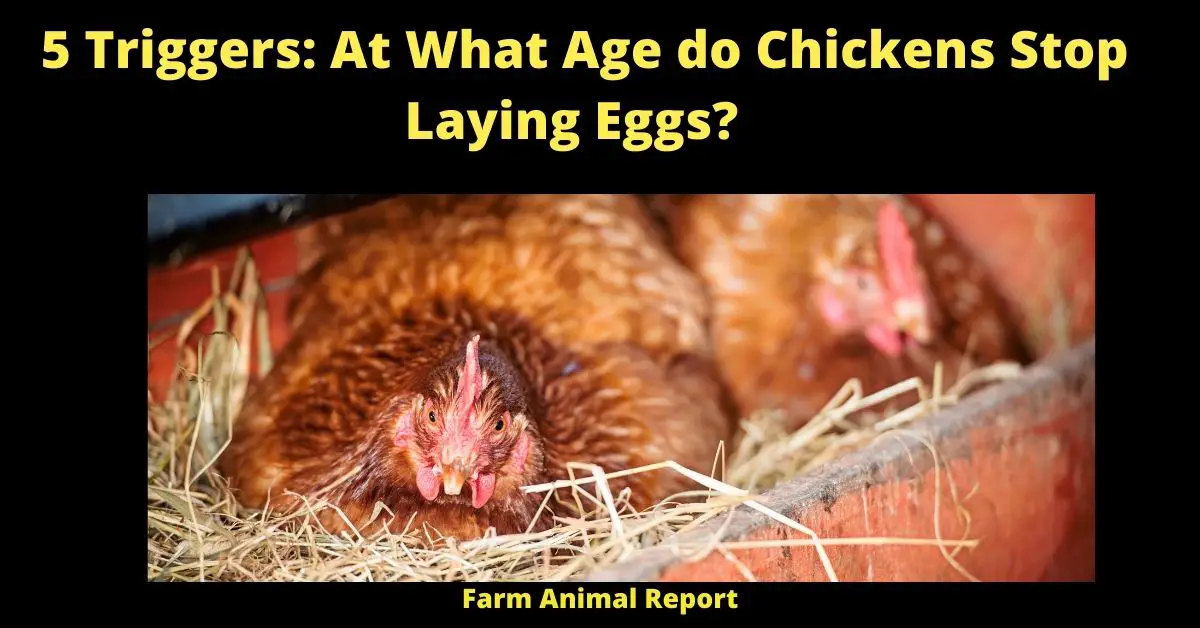
There are a number of factors that can affect a chicken’s egg-laying ability, including age, diet, and health. Generally speaking, hens will begin to slow down their egg production after two or three years. Some may lay fewer eggs in their fourth or fifth year, and a few may even continue to lay small numbers of eggs into their eighth or ninth year.
However, once a chicken reaches ten years of age, it is very unlikely that she will continue to lay eggs on a regular basis. There are some exceptions to this rule, of course, but for the most part, ten years is the point at which most chickens will retire from egg-laying.
What 5 Factors determine how Long a Hen will Lay Eggs?
Now that we know the average age at which chickens stop laying eggs, let’s take a closer look at the factors that can affect a hen’s egg-laying ability.
- Age – The first factor is age, as we mentioned before. Hens will usually start to slow down their egg production after two or three years. Some may lay fewer eggs in their fourth or fifth year, and a few may even continue to lay small numbers of eggs into their eighth or ninth year. However, once a chicken reaches ten years of age, it is very unlikely that she will continue to lay eggs on a regular basis.
- Diet – The second factor is diet. A hen’s diet plays a big role in her egg-laying ability. If she isn’t getting enough of the right nutrients, she won’t lay as many eggs.
- Health – The third factor is health. If a hen is sick or injured, she may not lay as many eggs.
- Stress– The fourth factor is stress. If a hen is stressed, she may not lay as many eggs.
- Light Exposure – The fifth and final factor is light exposure. Chickens need 14-16 hours of daylight to lay eggs. If they don’t get enough light, they may not lay as many eggs.So, there you have it!
- The sixth factor is the time of year. Chickens lay more eggs in the spring and summer than they do in the fall and winter.
So, there you have it! These are just a few of the factors that can affect a chicken’s egg-laying ability. If you’re thinking about getting chickens, keep these things in mind:
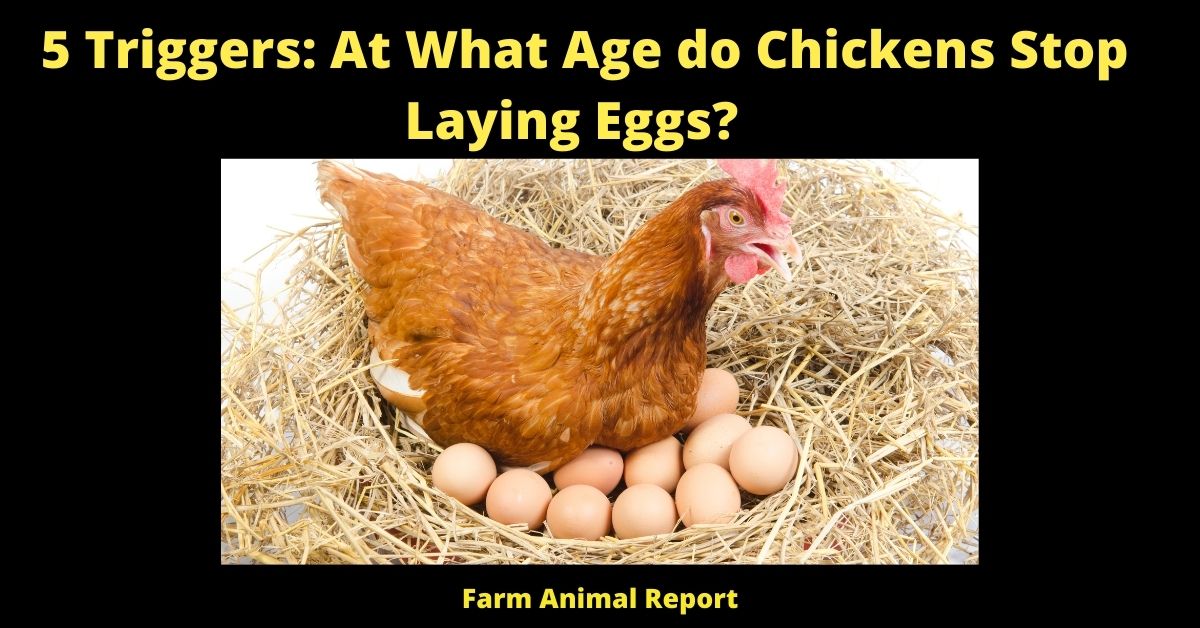
What is a Hens Laying Cycle?
See our Article – 5 Factors: How Long do Chickens Lay Eggs? The Surprising Truth About Egg Production
At its most basic, a hen’s laying cycle is a process of egg production, molting and rest. However, there are a number of factors that can influence a hen’s cycle, from the amount of daylight to the weather.
In the wild, hens typically lay in the spring and summer when there is an abundance of food available. However, domesticated hens can be kept on a regular laying schedule all year round. For commercial growers, this typically means putting the hens on a 14-16 hour light schedule to encourage year-round production.
Hens will also start to lay fewer eggs as they get older, so growers will often replace older birds with younger ones to maintain consistent production. while molting. During this time, hens will stop laying eggs and go through the process of regrowing their feathers. This usually lasts for around 6-8 weeks, after which the hens will start laying again.
Finally, it’s important to give hens a break from laying every now and then. This allows them to rest and recuperate and helps to prevent health problems associated with egg production. As a result, most commercial operations will have “resting flocks
Age – How Does a Chickens age Scientifically effect when a Hen stops Laying Eggs?
A chicken’s aging process is scientifically affected when a hen stops laying eggs. When a chicken reaches 18 to 24 months old they have generally reached full maturity and will produce the greatest number of eggs.
See our Article – Best Backyard Chickens For Eggs: Choosing The Right Breed
However, this cannot be said for all chicken breeds as some mature earlier and some lay more eggs than others. In general, a chicken’s egg production declines with age. This can be for several reasons such as disease, hereditary factors, or malnutrition.
More often than not, it is a combination of all three. Chickens are considered elderly when they are around 6 years old. At this point in their lives, they will experience a significant decrease in egg production and may even stop laying altogether
As the chicken ages, her body stops producing eggs as frequently. This is due to the fact that her ovaries are not able to produce as many eggs as they did when she was younger. Additionally, the quality of the eggs declines with age. This is due to the fact that the older a chicken gets, the more likely it is that her eggs will be infertile.
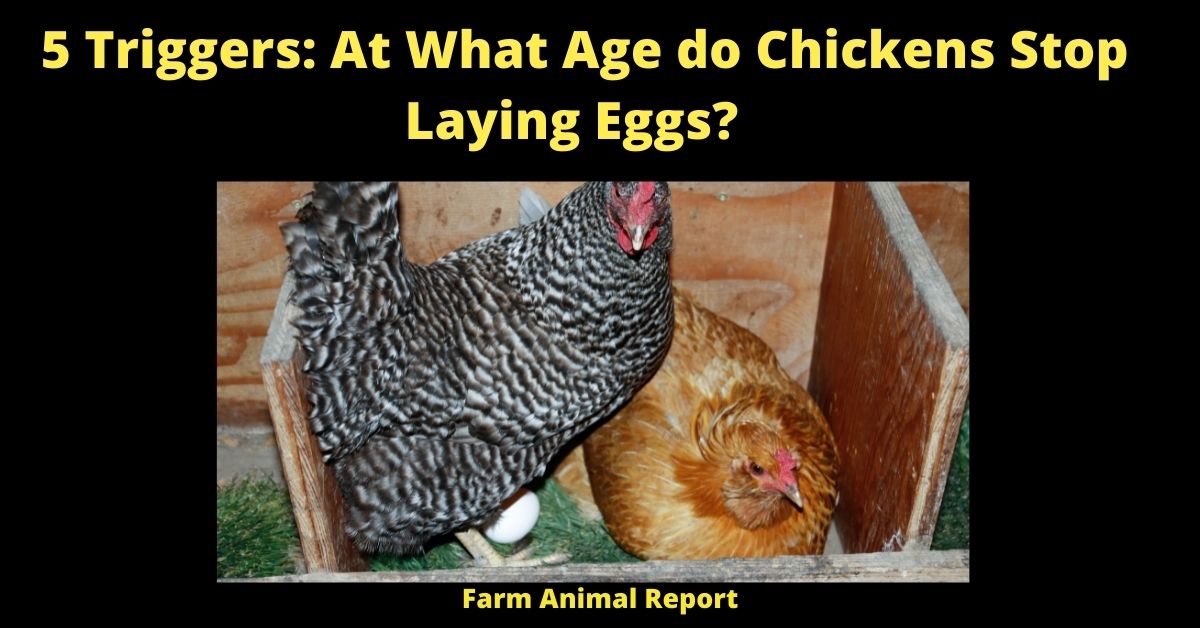
Diet – How Does a Chickens diet Scientifically affect when a Hen stops Laying Eggs?
Chickens are interesting creatures and their diet plays a big role in their lives. As many farmers know, a chicken’s diet can affect when they stop laying eggs. There are a few scientific reasons for this. First, chickens need a certain amount of calcium to produce eggs.
If they don’t get enough calcium, their egg production will suffer. Additionally, chickens need a high-protein diet in order to lay eggs. If they don’t get enough protein, their body will divert the protein to other uses, such as feather growth or muscle development, at the expense of egg production.
Finally, chickens need a good balance of vitamins and minerals in order to lay eggs. If they don’t get enough of certain vitamins or minerals, their egg production will decline. For example, vitamin A is essential for hens to produce eggs; if they don’t get enough vitamin A, their egg production will decrease. Consequently, a chicken’s diet is crucial for maintaining healthy egg production.
Light – How Does Light Scientifically effect when a Hen stops Laying Eggs?
As any farmer knows, light is a key factor in a hen’s egg-laying cycle. The length of the day dictates when a hen will start to lay eggs, and the amount of light also affects how many eggs she will produce.
When the days begin to lengthen in the spring, hens will start to lay more eggs. However, as summer days grow shorter, hens will slow down their egg production. This is because hens are sensitive to changes in the amount of light, and they require a certain amount of light each day in order to lay eggs.
While farmers can artificially extend the amount of daylight by using lamps or other lights, this is not always practical or economical. As a result, farmers must be aware of the effect that light can have on a hen’s egg-laying cycle in order to ensure that their flock is producing eggs at optimal levels.
Scientifically speaking, light affects the production of hormones in a hen’s body, which in turn determines when she will start and stop laying eggs. In the summer, when the days are long and there is plenty of sunlight, hens will lay more often.
As the days begin to get shorter in the fall, their hormone levels start to drop and they will lay fewer eggs. In the winter, when there is very little sunlight, they may stop laying altogether. This is why it’s important to provide artificial lighting for hens during the winter months if you want them to keep laying eggs. By understanding how light affects a hen’s body, you can help to ensure a consistent supply of fresh eggs all year round.
Health – How Does a Hens Health Scientifically effect when she stops Laying Eggs?
A hen’s health is crucial to her ability to lay eggs. In general, a healthy hen will lay one egg per day. However, there are a number of factors that can affect a hen’s health and, as a result, her egg-laying ability. For example, if a hen is suffering from an illness or injury, she may not be able to lay eggs.
Additionally, during molting season, hens will stop laying eggs while they regrow their feathers. Finally, as hens get older, their egg-laying ability will gradually decline. While these natural changes are to be expected, any sudden drop in egg production may be an indication that something is wrong with the hen’s health.
Therefore, it is important for farmers to closely monitor their flock’s health in order to ensure that they are able to produce eggs on a regular basis.
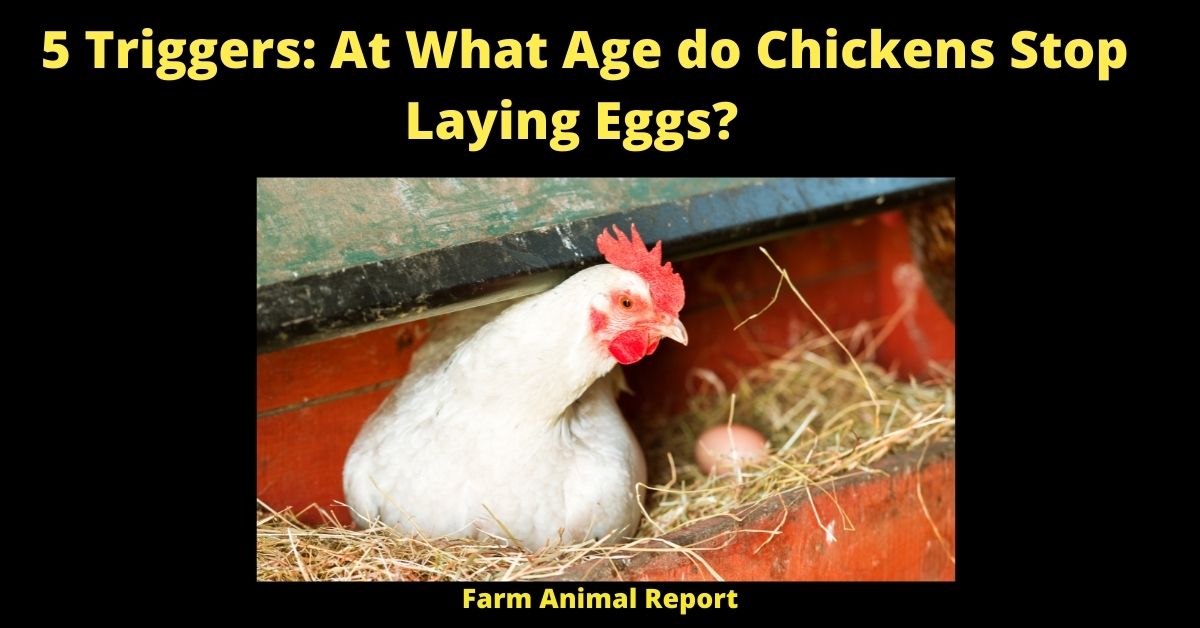
Stress – How Does Stress Scientifically effect when a hen stops Laying Eggs?
Chickens are very sensitive animals and are easily stressed. When a chicken is stressed, it will stop laying eggs. This is because the stress hormone, cortisol, prevents the chicken from ovulating. In other words, when a chicken is stressed, it doesn’t produce the eggs that it would normally lay.
So, if you’re a farmer, and you want your chickens to lay eggs, it’s important to keep them as stress-free as possible. There are a number of ways to do this, but some of the most effective include providing them with plenty of space, keeping their coop clean, and providing them with regular access to food and water. By taking these steps, you can help your chickens stay calm and avoid the negative effects of stress.
Presence of Predators will a hen stop laying eggs if she feels unsafe?
What Signs are there that a hen is getting too old to Lay Eggs?
When it comes to egg-laying chickens, there are a few signs that indicate that a hen is getting too old to produce.
One of the most obvious signs is a decrease in the number of eggs being laid. Chickens typically lay one egg per day, so a sudden drop-off in production is often an indication that the hen is no longer able to lay regularly.
Another sign that a chicken is getting old is a change in the appearance of the eggs themselves. Older hens often produce eggs with thinner shells, and the yolks may be smaller or paler than usual.
Finally, an older hen may also start to show physical signs of age, such as feathers that are dull or ragged. All of these signs indicate that a hen is nearing the end of her egg-laying years, and it may be time to retire her from the flock.
What can I do to extend My Hens Egg Laying Cycle?
There are a number of things you can do to extend your hens’ egg-laying cycle.
First, make sure they have plenty of fresh water and a balanced diet. Hens need a high-protein diet to lay eggs, so give them quality chicken feed and supplement with kitchen scraps if possible.
Secondly, provide your hens with plenty of nest space. A comfortable nest will encourage them to lay their eggs in the same place, which can help extend their laying cycle.
Finally, keep your coop clean and dry. A clean coop will help prevent disease, which can shorten a hen’s laying cycle. By taking these simple steps, you can help your hens lay eggs for longer periods of time.
Final Thoughts – At What Age do Chickens Stop Laying Eggs?
A Hen will generally begin slowing down egg production at 3-4 years of age. It will continue to decrease and eventually stop as her body is no longer capable of Producing Eggs
God Bless Greg


